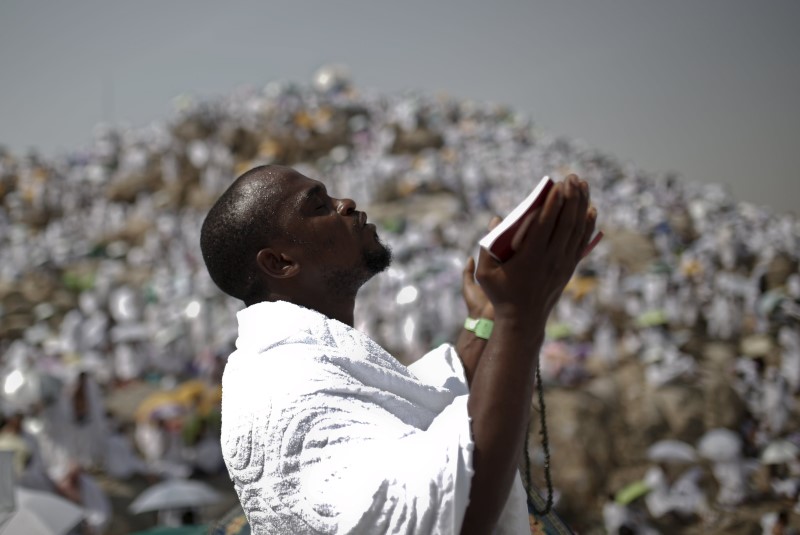By Nidal al-Mughrabi
ARAFAT, Saudi Arabia (Reuters) - Millions of Muslim pilgrims congregated at Arafat outside Mecca on Wednesday, many of them praying for peace in the Middle East countries ravaged by war and chaos as the annual haj reached its climax.
"What is left of our Arab nation? Iraq was the symbol of power and civilization. What happened to it now? Look at Syria: the refugees are greater in number than the pilgrims here," said Egyptian Mohammed Rizq, 65.
Haj is a duty for all Muslims at least once in their lives if they can afford it, and for many of the faith's 1.6 billion adherents it represents a moment of supreme spiritual worth that was reflected in the joy expressed at Arafat.
"I wish everyone could come here. I am sure they would leave with a good heart because here Islam was born," said Abdullah, a Chinese convert to Islam.
The rocky areas of Arafat, Mina and Muzdalifah a few kilometers east of Mecca are the main sites of haj, which culminates with Thursday's Eid al-Adha holiday, and are the location of rituals laid out by the Prophet Mohammed.
As early as Tuesday night, thousands of pilgrims left the haj camp at Mina and started climbing the low, rocky Mount Arafat where they will remain until sunset on Wednesday.
One old woman crawled up its steep slopes on hands and knees. Others scrawled their names on the rocks with pen to mark their presence.
But along with joy, many pilgrims also felt sadness and anger as the woes of the Muslim world weighed heavy on their minds.
Since the 2011 Arab uprisings, Iraq, Syria and Yemen have collapsed into civil war, Libya is paralyzed by conflict and refugee crises have upended life for many in Jordan, Lebanon and Turkey. Egypt remains politically fragile and Palestinians still have no state.
EXTREME SUMMER HEAT
Over breakfast, a group of pilgrims from different countries quizzed an Iraqi man who had fled an area controlled by the Islamic State militant group, which has seized swathes of Iraq and Syria and staged attacks elsewhere.
"Islam is mercy. How did they turn it into a curse, a punishment?" said one man.
Earlier, in the city of Mecca, a Yemeni pilgrim said he hoped peace might soon return to his country, where a Saudi-led Arab coalition this year joined the government's side in a civil war that has killed thousands, including by its own airstrikes.
"I have a million wishes. The first and the last is to have the happy Yemen back: the free and united Yemen," he said.
A Syrian pilgrim simply called down curses on President Bashar al-Assad, who is waging a war to end a four-year rebellion against his rule. "Bashar goes to hell," was his wish.
But pilgrims also prayed for personal matters. Abdullah, the Chinese pilgrim, expressed his hopes for the coming year.
"I wish my wife heals from her sickness, my son finishes school and my manager gives me the promotion I deserve," he said.
In the extreme summer heat, even early in the morning, many pilgrims clutched bottles of water or held umbrellas over their heads as they stood at Arafat.
Later on Wednesday they will descend to the plain of Muzdalifah where they will collect pebbles to "stone the devil" at a rite on Thursday.

(Writing By Angus McDowall; Editing by Raissa Kasolowsky)